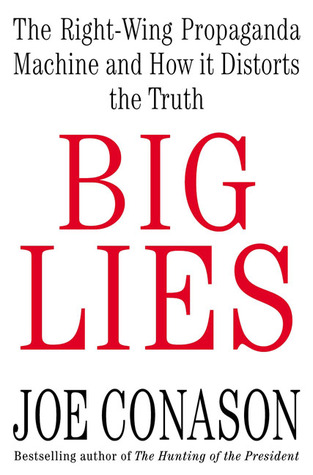Politics, said Henry Adams, “has always been the systematic organization of hatreds.” In recent months, best-seller lists have helped to prove Adams’ point, by featuring many vituperative political tracts from the left and right. The undisputed queen of the genre is Ann Coulter, whose overheated book Slander sold like hotcakes in 2002; lately, she has been joined by Sean Hannity (Let Freedom Ring) and Daniel Flynn (Why the Left Hates America), among others. On the left, stupid white man Michael Moore denuded numerous forests with sales of Stupid White Men (also in 2002). Joe Conason, of Salon.com and the New York Observer, now enters the fray on Moore’s end. Big Lies has risen up the New York Times best-seller list, in spite of being released in the shadow of Al Franken’s much more heavily hyped and similarly themed Lies and the Lying Liars Who Tell Them.
In focusing on the Bush administration, the Republican Congress, and their shock troops in the punditocracy, Conason has found a worthy set of targets. The President is a Fortunate Son who took repeated falls before he stumbled into the most powerful job in the world, owing largely to family connections. His supporters, having made “conservatism” synonymous with world domination by the U.S. government, now brand anyone, left or right, who diverges from their agenda as “anti-American.”
Conason is harshly critical of Republican tokenism and racial pandering. “Nowhere,” he states, “have Republicans failed quite so spectacularly in recent years as in their strange, fitful, sometimes duplicitous attempts to win over black Americans to their party . . . ” Although the GOP is, in essence, the party of white America, recent conventions have featured so many “persons of color” that a spectator might think that he was watching a show at the Apollo Theater, were it not for the lily-white audiences. (Big Lies calls the 2000 Republican convention a “minstrel show.”) Yet Conason downplays the notion that Democrats pander to and agitate blacks. He avoids mentioning such instances as President Clinton’s attempt to build up the bogus church-burning scare in 1996 with fictitious memories of similar burnings in Arkansas during his childhood or Vice President Gore’s warning (given to a black audience in the closing days of his 2000 campaign) that Bush, as president, would appoint Supreme Court justices who hearkened back to the days when blacks “were considered three-fifths of a human being.”
Big Lies makes hay of the right’s numerous moral reprobates, elaborating on the sordid details of the personal lives of many Republican politicians and conservative activists. Conason focuses particularly on Newt Gingrich, who led the Republicans to a majority in Congress in 1994 because, according to William Kristol, “they tapped into a deep sense that the country was morally and culturally in trouble.”
Yet, could anyone really have expected Newt Gingrich to lead a moral and cultural revival? While Gingrich was blaming the moral failings of the left for Susan Smith, a young South Carolina mother who drowned her two sons in 1994 and sent the police on a wild goose chase after a black carjacker, he was also cheating on his second wife, for whom the former speaker of the House left the first Mrs. Gingrich while she was hospitalized in 1978.
Conason finds ample fault with the Republicans’ response to terrorism, while holding President Clinton’s actions up as exemplary. He indicts Bush and the GOP for attempting to squelch investigation into the causes of the attacks of September 11 and for exploiting the ensuing patriotic atmosphere for political ends. In this regard, he dredges up recent events that are unlikely to appear in Ann Coulter’s version of reality:
Any honest examination of the roots of the September 11 attack would necessarily begin several years before Clinton was elected President—when the Central Intelligence Agency provided up to a billion dollars in aid to the Afghan mujahideen. Those resources, controlled by the Islamist generals who ran Pakistan’s Interservice Intelligence agency, were used to build the militant jihadist movements that later formed the Taliban and al-Qaeda.
The Afghan aid program, the purpose of which was to support a jihad against the Soviets, originated with President Reagan, whose record in the Middle East is incommensurate with the bloated reputation he enjoys among neoconservatives. Conason touches on Reagan’s dithering intervention in Lebanon in the early 1980’s, his playing both sides of the street in the Iran-Iraq War, and his attempts to trade arms for hostages with the Iranian regime.
By contrast, President Clinton was, in Conason’s eyes, a knight on a white horse in pursuit of terrorism. Conason denies that the ineffectual cruise-missile attacks in August 1998 against Afghanistan and the Sudan had any connection with the presidential sex scandal and suggests that the claim amounts to a smear against “ranking intelligence and military officers such as retired General Anthony Zinni, more recently Bush’s Mideast envoy, who encouraged Clinton to take that shot in the dark.” (Since there is no possibility of covering over the fact that the U.S. missile strike in the Sudan took out a factory engaged in making pharmaceuticals rather than chemical weapons, Conason simply neglects to mention that aspect of the attack.)
Although Big Lies mostly targets neoconservatives and Republican loyalists, Conason also attacks Pat Buchanan as a “racist” and accuses him, in so many words, of faking a knee injury (which, according to Buchanan’s autobiography, occurred in 1958) to avoid service in Vietnam.
Regrettably, political debate in this country will remain impoverished so long as the only arguments that get a hearing amount to competing versions of “Hooray for our side.”
[Big Lies: The Right Wing Propaganda Machine and How It Distorts the Truth, by Joe Conason (New York: St. Martin’s Press) 245 pp., $24.95]

Leave a Reply